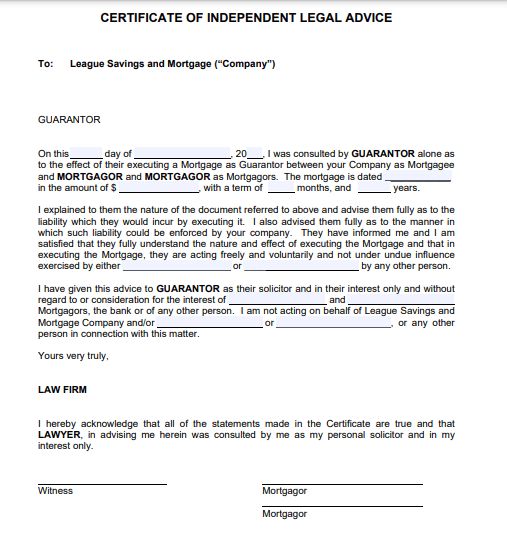A certificate of independent legal advice, also known as a “clergy certificate,” is a document that is often required in certain legal transactions to confirm that a person has received independent legal advice from a lawyer before entering into a legal agreement. This certificate is meant to protect the person’s interests and ensure that they fully understand the implications of the agreement they are entering into. In this article, we will explore what a certificate of independent legal advice is when it is required, and the process for obtaining one.
What is a Certificate of Independent Legal Advice?

A certificate of independent legal advice is a written statement from a lawyer attesting that they have provided independent legal advice to a person before they entered into a legal agreement. The certificate is meant to confirm that the person fully understands the implications of the agreement and is entering into it willingly and with full knowledge of its terms.
[web_stories title=”true” excerpt=”false” author=”false” date=”false” archive_link=”true” archive_link_label=”” circle_size=”150″ sharp_corners=”false” image_alignment=”left” number_of_columns=”1″ number_of_stories=”5″ order=”DESC” orderby=”post_title” view=”carousel” /]
The certificate is typically used in situations where there is a potential conflict of interest or power imbalance between the parties involved in the agreement. For example, it may be required when one party is much more financially or legally sophisticated than the other, or when one party is in a position of authority over the other, such as a parent or guardian giving legal advice to a child.
When is a Certificate of Independent Legal Advice Required?
There are several situations where a certificate of independent legal advice may be required. Some common examples include:
- When one party is entering into an agreement that could significantly impact their financial or legal rights, such as a prenuptial agreement or a contract to sell a business.
- When a person is entering into an agreement that could affect their mental or physical capacity, such as a power of attorney or a living will.
- When a person is entering into an agreement on behalf of someone else, such as a parent or guardian giving legal advice to a child.
- When a person is entering into an agreement with a company or organization that they work for, or that they have a close relationship with, such as a contract with a family business or a non-disclosure agreement with an employer.
The specific circumstances under which a certificate of independent legal advice is required will depend on the laws of the jurisdiction in which the agreement is being made and the nature of the agreement itself. It is important to consult with a lawyer to determine whether a certificate of independent legal advice is necessary for a particular situation.
How to Obtain a Certificate of Independent Legal Advice
To obtain a certificate of independent legal advice, the person seeking the certificate will typically need to meet with a lawyer and discuss the terms of the agreement in question. The lawyer will provide the person with independent legal advice on the agreement, explaining the potential risks and benefits and ensuring that the person fully understands the implications of the agreement.
Once the person has received independent legal advice, the lawyer will provide them with a written certificate attesting to this fact. The certificate will typically include the lawyer’s name and contact information, as well as a statement that the lawyer has provided independent legal advice to the person in question.
It is important to note that the lawyer providing the certificate of independent legal advice must be independent of the other parties involved in the agreement. This means that the lawyer must not have any financial or personal interest in the outcome of the agreement, and must not be affiliated with the other parties in any way.
The process for obtaining a certificate of independent legal advice will vary depending on the laws of the jurisdiction in which the agreement is being made. It is important to consult with a lawyer to determine the specific steps that need to be taken to obtain a certificate in a particular situation.